Using python - Study guides, Class notes & Summaries
Looking for the best study guides, study notes and summaries about Using python? On this page you'll find 1123 study documents about Using python.
Page 4 out of 1.123 results
Sort by
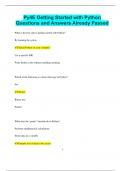
-
Py4E Getting Started with Python Questions and Answers Already Passed
- Exam (elaborations) • 37 pages • 2025
-
Available in package deal
-
 BrilliantScores
BrilliantScores
-
- $10.99
- + learn more
Py4E Getting Started with Python Questions and Answers Already Passed What is the first step to getting started with Python? By learning the syntax Install Python on your computer Use a specific IDE Write Python code without installing anything Which of the following is a basic data type in Python? Set Integer Binary tree Pointer What does the `print()` function do in Python? Performs mathematical calculations Stores data in a variable Outputs text or data to the screen ...
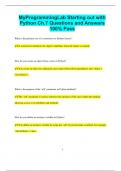
-
MyProgrammingLab Starting out with Python Ch.7 Questions and Answers 100% Pass
- Exam (elaborations) • 38 pages • 2025
-
Available in package deal
-
 BrilliantScores
BrilliantScores
-
- $10.99
- + learn more
MyProgrammingLab Starting out with Python Ch.7 Questions and Answers 100% Pass What is the primary use of a constructor in Python classes? A constructor initializes the object's attributes when the object is created. How do you create an object from a class in Python? You create an object by calling the class name followed by parentheses, like `object = ClassName()`. What is the purpose of the `self` parameter in Python methods? The `self` parameter is used to reference the i...
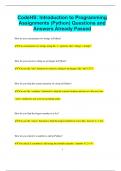
-
CodeHS: Introduction to Programming Assignments (Python) Questions and Answers Already Passed
- Exam (elaborations) • 53 pages • 2025
-
 BrilliantScores
BrilliantScores
-
- $11.99
- + learn more
CodeHS: Introduction to Programming Assignments (Python) Questions and Answers Already Passed How do you concatenate two strings in Python? You concatenate two strings using the `+` operator, like `string1 + string2`. How do you convert a string to an integer in Python? You use the `int()` function to convert a string to an integer, like `int("123")`. How do you skip the current iteration of a loop in Python? You use the `continue` statement to skip the current iteration an...
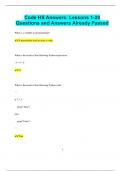
-
Code HS Answers: Lessons 1-20 Questions and Answers Already Passed
- Exam (elaborations) • 76 pages • 2025
-
 BrilliantScores
BrilliantScores
-
- $11.99
- + learn more
Code HS Answers: Lessons 1-20 Questions and Answers Already Passed What is a variable in programming? A placeholder used to store a value What is the result of the following Python expression: `3 + 4 * 2` 11 What is the result of the following Python code: ``` if 5 > 3: print("True") else: print("False") ``` True 2 What is a dictionary in Python? A collection of key-value pairs What is the result of accessing a non-existing key in a dictionary? I...
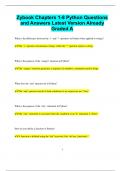
-
Zybook Chapters 1-8 Python Questions and Answers Latest Version Already Graded A
- Exam (elaborations) • 39 pages • 2025
-
 BrilliantScores
BrilliantScores
-
- $10.99
- + learn more
Zybook Chapters 1-8 Python Questions and Answers Latest Version Already Graded A What is the difference between the `+` and `*` operators in Python when applied to strings? The `+` operator concatenates strings, while the `*` operator repeats a string. What is the purpose of the `range()` function in Python? The `range()` function generates a sequence of numbers, commonly used in loops. What does the `and` operator do in Python? The `and` operator checks if both conditions in an ...
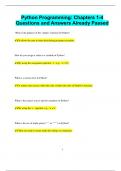
-
Python Programming: Chapters 1-4 Questions and Answers Already Passed
- Exam (elaborations) • 20 pages • 2025
-
 BrilliantScores
BrilliantScores
-
- $9.99
- + learn more
Python Programming: Chapters 1-4 Questions and Answers Already Passed What is the purpose of the `input()` function in Python? It allows the user to enter data during program execution. How do you assign a value to a variable in Python? By using the assignment operator `=`, e.g., `x = 10`. What is a syntax error in Python? A syntax error occurs when the code violates the rules of Python's structure. What is the correct way to add two numbers in Python? By using the `+` operat...
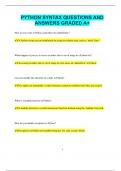
-
PYTHON SYNTAX QUESTIONS AND ANSWERS GRADED A+
- Exam (elaborations) • 21 pages • 2025
-
 BrilliantScores
BrilliantScores
-
- $9.99
- + learn more
PYTHON SYNTAX QUESTIONS AND ANSWERS GRADED A+ How do you write a Python script that runs indefinitely? A Python script can run indefinitely by using an infinite loop, such as `while True:`. What happens if you try to access an index that is out of range in a Python list? Accessing an index that is out of range in a list raises an `IndexError` in Python. Can you modify the elements of a tuple in Python? No, tuples are immutable, so their elements cannot be modified once they are cr...
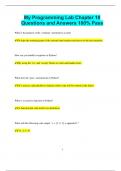
-
My Programming Lab Chapter 10 Questions and Answers 100% Pass
- Exam (elaborations) • 21 pages • 2025
-
 BrilliantScores
BrilliantScores
-
- $9.99
- + learn more
My Programming Lab Chapter 10 Questions and Answers 100% Pass What is the purpose of the `continue` statement in a loop? It skips the remaining part of the current loop iteration and moves to the next iteration. How can you handle exceptions in Python? By using the `try` and `except` blocks to catch and handle errors. What does the `pass` statement do in Python? It is used as a placeholder to indicate where code will be written in the future. What is a recursive function in Pytho...
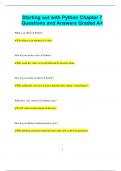
-
Starting out with Python Chapter 7 Questions and Answers Graded A+
- Exam (elaborations) • 21 pages • 2025
-
Available in package deal
-
 BrilliantScores
BrilliantScores
-
- $9.99
- + learn more
Starting out with Python Chapter 7 Questions and Answers Graded A+ What is an object in Python? An object is an instance of a class. How do you create a class in Python? By using the `class` keyword followed by the class name. How do you create an object in Python? By calling the class as if it were a function, like `object = ClassName()`. What does `self` refer to in a Python class? `self` refers to the instance of the class. How do you define a method inside a class? By de...
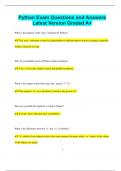
-
Python Exam Questions and Answers Latest Version Graded A+
- Exam (elaborations) • 27 pages • 2025
-
 BrilliantScores
BrilliantScores
-
- $9.99
- + learn more
Python Exam Questions and Answers Latest Version Graded A+ What is the purpose of the `pass` statement in Python? The `pass` statement is used as a placeholder to indicate that no action is required, typically within a function or loop. How do you handle errors in Python using exceptions? Use a `try-except` block to catch and handle exceptions. What is the output of the following code: `print(2 ** 3)`? The output is `8`, as it calculates 2 raised to the power of 3. How can ...

How much did you already spend on Stuvia? Imagine there are plenty more of you out there paying for study notes, but this time YOU are the seller. Ka-ching! Discover all about earning on Stuvia


